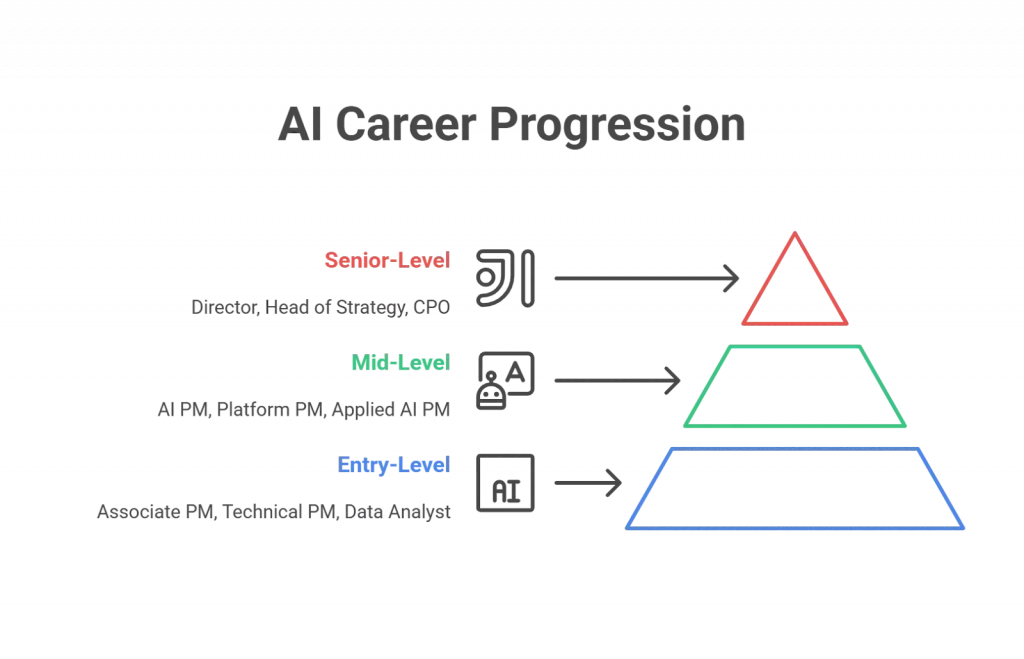Artificial Intelligence (AI) is transforming industries and the epicentre of this revolution is the AI Product Manager. Since the business world is scrambling to apply machine learning, Natural Language Processing (NLP), computer vision and automation to its services, the necessity to find people who can fill the gap between what the business wants to achieve and what AI can do is growing exponentially.
In this guide, you will learn what an AI product manager is and what skills you need to be an AI product manager, career paths, main responsibilities, and how to enter into this high-impact career.
Who is an AI Product Manager?
The role of an AI Product Manager (AI PM) is to identify business opportunities where AI can be applied, collaborate with data science and engineering teams to develop solutions, and ensure that products created with the help of AI deliver actual value to users.
In contrast to traditional PMs, AI PMs have to work with unpredictable model behavior, data constraints, and ethical concerns, and need a combination of technical expertise, product-first first and responsible AI expertise.
Key Responsibilities
- Collaborate with data scientists, engineers, and stakeholders
- Define product vision and AI use cases
- Manage model lifecycle (from prototyping to deployment)
- Evaluate AI performance and iterate based on feedback
- Ensure compliance with fairness, accountability, and transparency standards
Skills Required for AI Product Manager Roles
To succeed as an AI product manager, you need a unique combination of technical, business, and soft skills:
1. AI and Machine Learning Fundamentals
Understanding supervised and unsupervised learning, model evaluation metrics, data pipelines, and the limitations of AI systems is essential. You don’t need to build models, but you must understand how they work.
2. Product Management Expertise
- Defining product strategy and roadmaps
- Conducting market and user research
- Prioritizing features using frameworks like RICE or MoSCoW
- Agile and Scrum methodologies
3. Data Literacy and Analytics
You must be comfortable working with data, interpreting dashboards, collaborating on data labeling tasks, and asking the right questions during error analysis.
Explore the basics and applications of statistical modeling in this detailed guide by Great Learning.
4. Cross-Functional Communication
AI PMs act as translators between business, data science, and engineering teams. Strong storytelling and stakeholder alignment are key.
5. Ethics and Responsible AI
Knowledge of fairness, bias mitigation, explainability (XAI), and model transparency is crucial when shipping AI to production.
6. Basic Programming & Tools
While coding isn’t mandatory, familiarity with:
- Python
- Jupyter Notebooks
- ML lifecycle tools (e.g., MLflow, Weights & Biases) can significantly help in working with technical teams.
Educational Background and Learning Paths
There’s no single path, but a strong foundation in computer science, engineering, or data science is typical. Many professionals also come from business or UX backgrounds and later upskill in AI.
Recommended Learning Paths:
- AI and ML certifications from IITs, Stanford, or Great Learning
- PM bootcamps focusing on tech products
- Online specializations in Responsible AI and model governance
Career Path & Progression

Salary Expectations
Salaries vary by region and company size. In general:
In India, entry-level AI PMs can expect ₹17–37 LPA at top firms, with senior roles exceeding ₹50+ LPA.
Roadmap to Becoming an AI Product Manager
This is a step-by-step plan to help you along the way:

Step 1: Learn the principles of AI products
Become familiar with the ways the AI products contrast with conventional software, paying attention to iteration, the dependencies on data, and the probabilistic results.
Step 2: Acquire AI fundamentals
Learn ML, NLP, deep learning, and model assessment. Practical work will increase your confidence. Learn now at no cost with these AI and ML courses on the Great Learning Academy.
Step 3: Develop a Product Thinking
Begin developing product specifications, user story writing and user journey analysis. To get a feel of working, use Miro and Notion.
Step 4: Open Source or AI Project Work
Team up with data scientists in GitHub or Kaggle. This will assist you to learn about workflows and gain credibility.
Step 5: Applying to be a PM or APM in AI Teams
Focus on start-ups, research centers, and AI-first enterprises. Demonstrate an ability to translate engineering knowledge to product choices.
Last Advice to Would-Be AI Product Managers
- Keep up with AI trends (e.g., GenAI, LLMs, edge AI)
- Read Google, Meta, and OpenAI case studies
- Focus on user experiences, even on workflows that involve a lot of data
- Participate in AI and PM meetups, webinars and hackathons
- Construct a portfolio of your product vision and knowledge of how the model works
Also Read: How to Become a Prompt Engineer
Conclusion
The path to becoming an AI product manager is a worthwhile one to those who are able to combine data-driven thinking, empathy towards users, and technical fluency.
With the AI revolutionizing industries, AI PMs will be at the forefront of developing ethical, scalable, and impactful products.
Frequently Asked Questions(FAQs)
1. Does one have to be a data scientist to be an AI PM?
No. You should have a knowledge of machine learning principles and processes, although you should not be expected to create models. The most important thing you can do is to reconcile product strategy and technical feasibility.
2. Do AI product managers have to code?
Not necessarily. Although familiarity with Python or data querying is helpful, AI PMs are not expected to spend their days writing code or working on the technical side of the products they work on.
3. Which tools are to be learned?
Such tools as Jupyter Notebooks, SQL, MLflow, Tableau, Jira, Figma, and Confluence can be useful. It is more significant to be tool-agnostic and data-aware rather than to know one particular tool.
4. What is the process of becoming an AI PM when I am a software PM?
Begin with the basics of ML, and developing AI-adjacent features, and directly collaborate with data science groups to get a feel of the model-building lifecycle and its product implications.
5. Which industries need AI product managers today?
The demand for AI PMs exists in many industries, including healthcare, finance, e-commerce, SaaS, edtech, automotive, and generative AI startups. Every sector that uses data and automation is recruiting.

